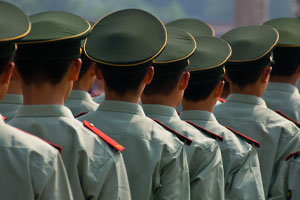
Chinese leader Xi Jinping’s purge of those not fully aligned with his ever-evolving party line has led to unexplained and sudden changes in senior military personnel, including the removal of the Defense Minister and the expulsion of nine high-ranking People’s Liberation Army officers (PLA) from the national legislature, as well as dropping three top defense-industry executives from their government advisory roles.
Among those thus removed are two generals who previously commanded China’s strategic missile force, a former Air Force Chief, and an admiral who led naval forces in the South China Sea, where China is increasingly at odds with the United States and other nations in this contentious region.
Beijing has not disclosed its reasons for their removal nor released information on any investigations into their conduct. Analysts who study China’s military, however, believe it is likely that the ongoing shakeup is part of Xi’s effort to combat corruption related to arms procurement and to stem potential disloyalty within the PLA and state-owned enterprises associated with defense production.
Xi faces a virtually insurmountable problem in rooting out corruption. Communism exhibits systemic inadequacies and fosters a culture of impunity in which corruption can flourish, often unchecked. These inherent failures of socialism are intensified by a lack of personal accountability, a fruit of an atheistic society.
The negative public perception of informants, used by the State to enforce communism, hinders the support for whistleblowers, which is more common in the Free World. Thus, instances of corruption are seldom reported to officials with the authority to prosecute them.
Lyle Morris, a senior fellow at the Asia Society Policy Institute specializing in Chinese security affairs, has noted that China’s military arms development and procurement agency has long been considered a breeding ground for corruption. However, until recently, few senior officials involved in such work were targeted in Xi’s anti-corruption campaign.
Help Remove Jesus Bath Mat on Amazon
The present purge reflects Xi’s secure power base within the PLA, enabling him to undertake such a massive campaign without fear of backlash. At the same time, however, it evidences the inherent weakness of a dictator who must impose his will without regard for the law.
While the impact of such radical restructuring on the PLA’s operational readiness remains unclear, analysts suggest that the corruption probes could lead to increased scrutiny of personnel appointments and procurement processes, which will likely slow Xi’s efforts to modernize the military.
Beijing claims initial success in upgrading the PLA through complex drills, including combined aerial and naval maneuvers. While acknowledging shortcomings requiring attention, the overall combat capabilities of the PLA are unlikely to have been compromised significantly in the short run.
By addressing arms procurement and the strategic missile force, Xi hopes to ensure long-term military effectiveness. Chinese high command has taken note of the abysmal performance of Russian weapons systems in its Ukraine conflict, much of which is attributed to systemic corruption.
Satanic Christ Porn-blasphemy at Walmart — Sign Petition
The PLA could focus greater attention on party loyalty within its ranks and increase political education for military personnel. Indeed, under Xi, the party has intensified ideological indoctrination, indicating that Xi’s purge may not be as much about private gains at the State’s expense as it is about adherence to the party line.
Such focus may come at the expense of operational training and combat readiness. Experts on Chinese policy argue that Xi has used continual purges to consolidate his authority and enforce commitment to his policies. This reliance on coercion underscores a significant weakness of communism. As hardly anyone believes in communist doctrine, compliance must be motivated by fear rather than commitment to noble ideals to combat corruption.
Since assuming power in late 2012, Xi has employed corruption probes to control the military establishment and implement an ambitious modernization program to transform the Chinese military from a Soviet-style force into a modern 21st-century military. In the initial years of Xi’s regime, several senior generals were purged to pave the way for officers considered more professional and doctrinally reliable.
While they retain their military and party ranks, they are expected to be removed entirely from leadership positions. Military analysts also believe investigations will likely be launched at lower levels and other departments.
How Panera’s Socialist Bread Ruined Company
Nonetheless, the PLA has maintained a high operational pace. Aerial sorties and naval drills have been conducted along China’s borders and beyond. In recent months, a Chinese aircraft carrier task group conducted combat training in the Pacific Ocean, and PLA forces took part in joint exercises with foreign counterparts.
The PLA’s Southern Theater Command recently announced the dispatch of naval and air forces on routine patrols in the South China Sea. China continues to harass countries with the deployment of balloons that have been flown over the United States and Taiwan as part of Beijing’s “gray-zone” tactics to intimidate without the direct use of force.
It is unlikely that Beijing will challenge Washington’s status as the dominant world military power or unilaterally alter the status quo in the Taiwan Strait in the foreseeable future. James Char, a research fellow at Nanyang Technological University in Singapore, believes that the PLA will likely continue to engage in military operations that remain below the threshold of war, using harassment and intimidation to test the mettle of the West.
Xi recognizes that China’s military is suffering from an outdated Soviet-style structure similar to Russia’s, which has been incapable of conquering a border country a quarter its size. This is not the performance one would anticipate from a world military power. While Xi’s dream of creating a first-world military remains to be realized, it would be foolhardy to continue to sleep as Communist China advances in its quest to vanquish the remnants of Christian Civilization in the West.
Photo Credit: © Mike – stock.adobe.com


